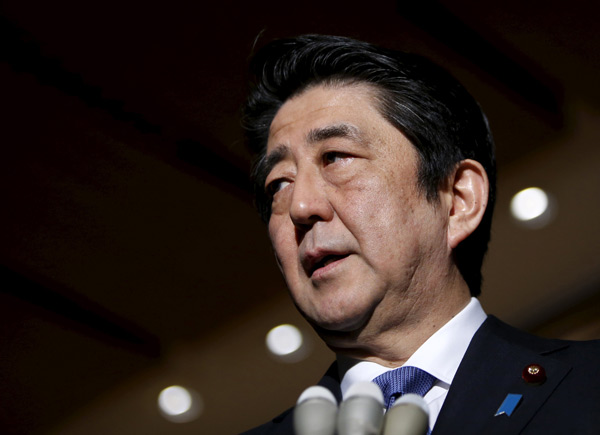Abe's desire to pursue constitutional change risks alienating public
Updated: 2016-03-07 08:05
By CAI HONG(China Daily)
|
||||||||
 |
|
Japan's Prime Minister Shinzo Abe speaks to reporters at Abe's official residence in Tokyo, Japan, January 28, 2016. Japanese Prime Minister Shinzo Abe said on Thursday he wants the new economy minister, Nobuteru Ishihara, to continue the government's efforts to push through structural reforms. [Photo/Agencies] |
With his second three-year term as president of the ruling Liberal Democratic Party expiring in Sept 2018, Japan's Prime Minister Shinzo Abe has set himself the goal of revising the country's Constitution in the next two and a half years.
Abe unveiled his intention at the House of Councilors Budget Committee on Wednesday, although he was reticent about how he planned to rewrite the Constitution.
Following Japan's unconditional surrender to the Allied powers, the Japanese government introduced the so-called peace Constitution that eliminates a standing army and renounces war.
If Japanese public opinion has generally embraced Japan's status as a peaceful nation, conservatives and nationalists led by Abe have repeatedly attempted to revise the country's Constitution, which they consider a foreign imposition on Japan.
Above all else, Abe and other members of his party believe that Japan cannot fully regain its sovereignty until it has effectively changed the current Constitution.
But Abe is also seeking to revise Japan's Constitution by late 2018 to remove the constraints on his defense policies.
The House of Councilors election in July will be a golden, and possibly last, opportunity for Abe to give it a try, since half of the upper house's berths are up for grabs.
Constitutional amendment needs the approval of two-thirds of each house of parliament and a majority of voters in a national referendum.
During Abe's first term as prime minister in 2006 to 2007, he prepared the ground for this by passing a law on how to hold a national referendum when amending the Constitution. This set in place an essential steppingstone for eventual revision.
- Global health entering new era: WHO chief
- Brazil's planning minister steps aside after recordings revelation
- Vietnam, US adopt joint statement on advancing comprehensive partnership
- European border closures 'inhumane': UN refugee agency
- Japan's foreign minister calls A-bombings extremely regrettable
- Fukushima impact unprecedented for oceans: US expert

 Stars of Lijiang River: Elderly brothers with white beards
Stars of Lijiang River: Elderly brothers with white beards
 Wealthy Chinese children paying money to learn British manners
Wealthy Chinese children paying money to learn British manners
 Military-style wedding: Fighter jets, grooms in dashing uniforms
Military-style wedding: Fighter jets, grooms in dashing uniforms
 Striking photos around the world: May 16 - May 22
Striking photos around the world: May 16 - May 22
 Robots help elderly in nursing home in east China
Robots help elderly in nursing home in east China
 Hanging in the air: Chongqing holds rescue drill
Hanging in the air: Chongqing holds rescue drill
 2.1-ton tofu finishes in two hours in central China
2.1-ton tofu finishes in two hours in central China
 Six things you may not know about Grain Buds
Six things you may not know about Grain Buds
Most Viewed
Editor's Picks

|

|

|

|

|

|
Today's Top News
Liang avoids jail in shooting death
China's finance minister addresses ratings downgrade
Duke alumni visit Chinese Embassy
Marriott unlikely to top Anbang offer for Starwood: Observers
Chinese biopharma debuts on Nasdaq
What ends Jeb Bush's White House hopes
Investigation for Nicolas's campaign
Will US-ASEAN meeting be good for region?
US Weekly

|

|









